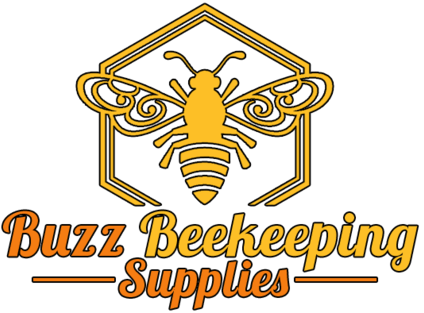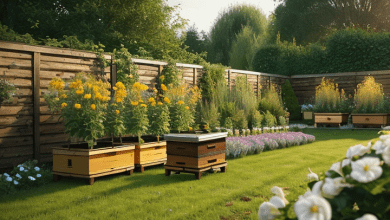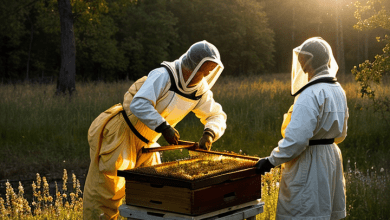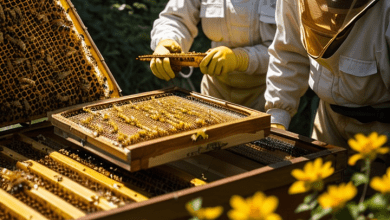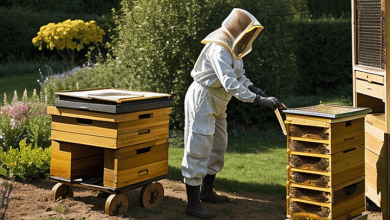Beekeeping Supplies Massachusetts
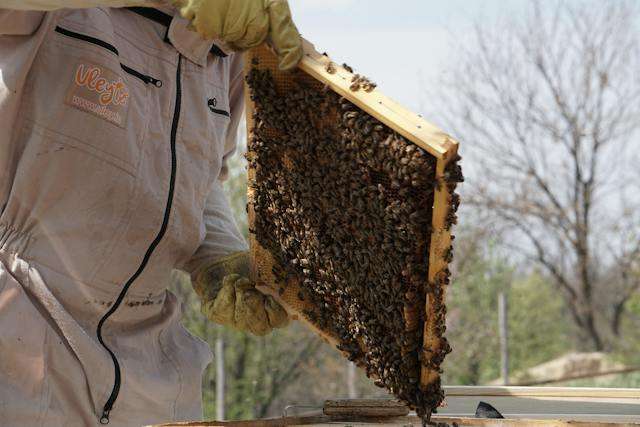
Beekeeping is a fascinating and rewarding hobby that has gained popularity in Massachusetts over the years. Whether you are a beginner or an experienced beekeeper, having access to quality beekeeping supplies is essential for the success of your colonies.
In this article, we will explore the various beekeeping supplies available in Massachusetts and discuss their importance in maintaining healthy and thriving honeybee colonies.
No matter where you are looking for beekeeping supplies in Massachusetts, we’ve got you covered.
Beekeeping in Massachusetts
- Massachusetts is known for its unique flora, resulting in delicious and unique honey flavors.
- Massachusetts features a climate with warm summers and cold winters, providing a suitable environment for honeybees.
- Massachusetts is home to a diverse beekeeping industry, as current estimates indicate that there are between 4,000 to 4,500 beekeepers managing up to 45,000 colonies.
Beekeeping Equipment
Beekeeping is a rewarding and essential practice that requires the right equipment to ensure the well-being of honeybee colonies. Understanding the necessary bee supplies is crucial before embarking on a beekeeping journey.
Beehive Components:
A beekeeper’s most fundamental necessity is a beehive, which serves as the home for the honeybees. In Massachusetts, a variety of beehives and components suitable for different beekeeping methods are available. Popular options include Langstroth hives, top bar hives, and Warré hives.
- Hive Boxes: The Heart of the Beehive – Hive boxes, also known as supers, are one of the most vital components of a beehive. They serve as the living quarters for honeybees and provide space for their honeycombs. The type and quality of hive boxes used can greatly impact the overall health and productivity of a honeybee colony. Properly chosen hive boxes can support the natural behavior of honeybees and enable efficient management of the hive.
- Frames: Structural Support for Honeycombs – Frames are suspended within each hive box and provide structural support for the honeycombs. They serve as a foundation for brood rearing and honey storage, playing a crucial role in maintaining the organization and well-being of the bee colony. Well-assembled frames contribute to the overall management of the bee colony, allowing beekeepers to effectively monitor and maintain the health and productivity of the honeybees.
- Bottom Boards: Providing Stability and Ventilation – Bottom boards serve as the base of the beehive, offering stability and ventilation while providing an entrance for the honeybees to freely come and go. They also play a crucial role in defending the colony against potential intruders.Properly designed and maintained bottom boards contribute to the overall health and security of the honeybee colony, ensuring a safe and comfortable environment for the bees.
- Inner Covers and Outer Covers: Insulation and Protection – Completing the structural integrity of the hive, inner covers and outer covers provide insulation and protection to the honeybees. Inner covers add an extra layer of insulation, while outer covers safeguard the hive from adverse weather conditions. High-quality inner and outer covers are essential for creating a stable and secure habitat for honeybees, protecting them from environmental elements and ensuring their well-being.
Having high-quality hive boxes, frames, bottom boards, inner covers, and outer covers is crucial for successful hive management. These essential beekeeping supplies are designed to accommodate various stages of bee colony growth and maintain the comfort and productivity of honeybees.
Beekeeping Protective Gear
Beekeeping is a rewarding and fascinating activity, but it comes with its share of risks, particularly in the form of bee stings. Acquiring the right protective gear is crucial for beekeepers to ensure their safety and comfort during beekeeping activities.
Choosing the Right Bee Suit
A bee suit is perhaps the most essential piece of protective clothing for beekeepers. It provides invaluable defense against bee stings and ensures comprehensive coverage during beekeeping tasks. There are two primary types of bee suits to consider:
- Canvas Beekeeping Suits: Known for their durability and outstanding resistance to bee stings, canvas beekeeping suits offer robust protection for beekeepers.
- Ventilated Bee Suits: Crafted with breathable mesh fabric, ventilated bee suits allow beekeepers to work comfortably in hot weather conditions while still ensuring steadfast protection from bee stings.
Selecting the Perfect Bee Gloves
The selection of appropriate beekeeping gloves is crucial to safeguarding hands against stings while preserving dexterity. The two primary options include:
- Goatskin Bee Gloves: Celebrated for their exceptional tactile sensitivity, goatskin bee gloves empower beekeepers to handle delicate tasks with ease while shielding against stings.
- Cowhide Bee Gloves: With their thick leather construction, cowhide bee gloves provide robust protection, assuring beekeepers’ hands remain safe throughout beekeeping activities.
Fortifying the Feet with Beekeeping Boots
Engineered to impede bee access to the feet, beekeeping boots are an essential addition to beekeeping supplies, ensuring that the feet remain safeguarded during tending to honey bee colonies.
Shielding the Face and Neck with a Veil
A dependable beekeeping veil, meticulously created from fine mesh, plays a critical role in shielding the face and neck from bee stings, offering optimal visibility while preventing bee contact with the skin.
Purchasing Options and Considerations
Beekeepers can often procure a combo pack consisting of a bee suit and bee gloves at a discounted price, offering a convenient and cost-effective solution for acquiring indispensable protective clothing for beekeeping.
Investing in superior-quality protective gear is pivotal for beekeepers to guarantee safety and comfort during their beekeeping endeavors. Acquiring a comprehensive understanding of the diverse options available for bee suits, gloves, boots, and veils empowers beekeepers to make informed decisions that will elevate their beekeeping journey.
Beekeeping Tools
Beekeeping is a delicate and rewarding activity, and having the right tools is crucial for effectively managing hives. Massachusetts-based beekeepers, in particular, need to ensure they have the necessary equipment to maintain the well-being of their honeybees. Here are some of the most vital beekeeping tools that every beekeeper in Massachusetts should have in their arsenal.
- Bee Smoker: The bee smoker is an indispensable tool for calming honeybees during hive inspections. Emitting cool smoke that masks the alarm pheromones released by guard bees, the smoker helps pacify the colony and minimizes the risk of stings. It also triggers a feeding response in bees, reducing their inclination to sting. Every beekeeper in Massachusetts should keep a smoker and extra fuel on hand for effective hive management.
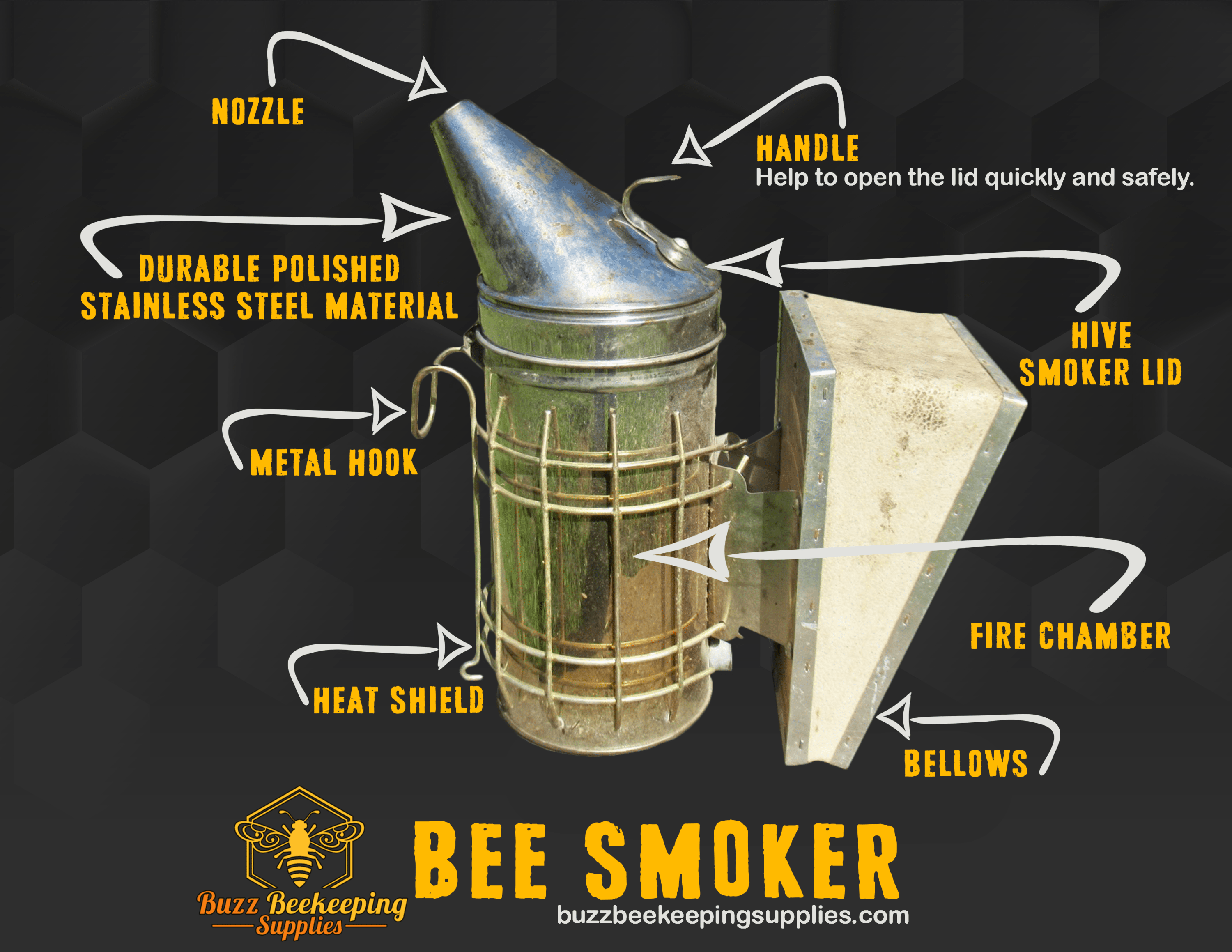
- Hive Tool: The hive tool is used for separating and prying apart hive components during inspections. With its flat blade and curved hook design, beekeepers can effortlessly lift frames, scrape off excess propolis, and remove burr comb. Its sturdy construction ensures that beekeepers can efficiently dismantle and reassemble their hives without causing harm to the bees or equipment.
- Bee Brush: Designed with the utmost care for the bees’ well-being, the bee brush allows beekeepers to gently move bees away from specific areas during inspections. Its soft bristles ensure that the bees are not harmed or stressed during the process, preventing unnecessary crushing or injuries and establishing harmonious interaction between beekeepers and their cherished honeybees.
- Queen Marking Tools: Queen marking tools are essential for identifying and tracking the queen bee within a colony. These tools usually consist of small, colored plastic or metal markers that can be applied to the queen’s thorax. The color-coded system established by beekeeping associations provides vital information about the queen’s age and year, enabling beekeepers to easily locate and monitor her during hive inspections.
Having the right beekeeping tools is indispensable for successful hive management in Massachusetts. Each of these tools serves a specific purpose, contributing to the well-being of the bees and enhancing the smooth operation of a beekeeping business.
Hive Feeders
Beekeepers play a crucial role in ensuring the well-being of their bee colonies. A consistent and reliable source of food is essential for the bees to thrive, especially during periods of scarcity or when establishing new colonies. Hive feeders are the key to providing supplemental nourishment to the bees, ensuring that they have the energy necessary to produce honey and expand their population.
Hive feeders are specifically designed to hold various types of supplemental food, such as sugar syrup or pollen substitute, that can be readily consumed by the bees. These tools provide an accessible and controlled source of nutrition, empowering beekeepers to support their bees’ nutritional requirements.
Types of Hive Feeders: Options for Every Beekeeper
- Positioned near the hive entrance, these feeders offer easy access to supplemental food for the bees.
- Known for their simplicity of use and monitoring, entrance feeders cater to beekeepers of all experience levels.
- Similar to entrance feeders, they are placed at the hive entrance and feature a small plastic or glass jar with tiny holes or slits on the lid.
- Boardman feeders are often used with commercially available sugar water mixes and can hold larger volumes of food compared to entrance feeders.
- Positioned directly on top of the hive, just below the outer cover, top feeders can hold significant amounts of food.
- Equipped with floats or caps to prevent drowning, this type of feeder allows beekeepers to provide ample food without frequent disturbances to the hive.
- Positioned inside the hive, replacing one or more frames in the brood nest area, ensuring easy access and minimal disruption to the hive’s organization.
- These feeders can hold liquid feed, such as sugar syrup or pollen substitute, serving as an efficient means of nourishing the bees.
Hive feeders are instrumental in ensuring that bee colonies have the energy necessary to thrive, produce honey, and expand their population. From entrance feeders to division board feeders, each type serves a specific purpose and offers unique benefits to beekeepers.
Feeding Honeybees: Enhancing Bee Nutrition for Health and Productivity
Honeybees rely primarily on honey for their nourishment, but there are circumstances that require additional feeding to maintain the health and efficiency of the bees.
Sugar Syrup: Sugar syrup is a commonly used option for providing additional nutrition to honeybees. It is a convenient choice for beekeepers and can be easily prepared by dissolving granulated sugar in water.
Key Considerations for Sugar Syrup Feeding:
- Easy Preparation: Making sugar syrup is a straightforward process that involves dissolving granulated sugar in water.
- Proper Ratios: The ratio of sugar to water varies depending on the time of year, with a common ratio of 1 part sugar to 1 part water in spring and summer, and a ratio of 2 parts sugar to 1 part water in the fall.
- Safety First: It is crucial to use only granulated white sugar when preparing sugar syrup, avoiding the use of honey, brown sugar, or other sweeteners.
Protein Patties: Boosting Protein Intake – Protein patties are another option to increase the protein intake of bees. These patties are typically made with soy flour, brewer’s yeast, and essential nutrients, providing a supplemental source of protein when natural sources are limited.
Pollen Substitute: Filling the Gap in Natural Pollen Sources – When natural pollen sources are scarce, a pollen substitute can help meet the bees’ dietary requirements. While natural pollen is preferable, substitutes can provide essential nutrition during times of restricted availability.
Here is a video of a DIY pollen feeder.
- Commercial Pollen Substitute Options – Beekeepers have the option of obtaining commercially available pollen substitutes, which can be mixed with water to form a patty-like consistency. This offers an alternative source of nutrition for the bees.
- Supplements: Enhancing Bee Nutrition – Similar to humans, bees can benefit from mineral and vitamin supplementation. Commercial mineral mixes or homemade solutions containing vitamins such as B vitamins and vitamin C can be added to sugar syrup or sprinkled directly onto the hive frames.
Providing honeybees with a diverse and well-rounded diet is crucial for their overall well-being and productivity. While honey remains their primary source of nutrition, additional feeding through sugar syrup and pollen substitutes can be advantageous in ensuring their optimal health.
Pest Control Products for Beekeepers
Effective pest control is crucial for beekeepers to safeguard honeybee colonies against potential threats and diseases. The health and productivity of bee colonies rely on proper pest management and disease control.
Varroa Mite Treatments: Varroa mites pose a significant threat to honeybee colonies, as they target adult bees and their developing brood. Prioritizing Varroa mite control is essential for maintaining colony health and preventing decline. Beekeepers have several options for managing Varroa mite infestations.
Chemical Treatments for Varroa Mites: Among the most common methods, chemical treatments utilizing substances like formic acid or oxalic acid are effective in reducing Varroa mite populations in hives. When used according to manufacturer instructions, these treatments provide reliable control over the mite infestations.
Organic Alternatives for Varroa Mite Control: For beekeepers who prefer natural approaches, organic treatments such as thermal treatments, thymol-based products, and essential oils offer environmentally friendly solutions for managing Varroa mite infestations.
Wax Moth Control: Wax moths can cause significant damage to honeybee hives by infesting and feeding on beeswax comb. Proactive management of wax moth populations is critical to preventing harm to bee colonies.
- Chemical Treatments for Wax Moth Control: Common chemical treatments involving paradichlorobenzene or freezing frames effectively target and eliminate wax moth infestations, preserving the integrity of beeswax comb and overall colony health.
- Hive Inspections for Wax Moth Prevention: Regular inspections are essential for identifying early signs of wax moth activity, allowing beekeepers to take swift action to prevent infestations from escalating.
Hive Beetle Control: Hive beetles can cause significant damage to beehives, affecting brood, honey, and overall colony health. Various methods are available to combat this pest.
- Hive Beetle Traps: Utilizing trap designs such as oil-based traps, screen-type traps, or natural traps with diatomaceous earth can effectively control hive beetle populations.
- Thermal Treatments: Subjecting infested hives to controlled temperatures, usually between 102°F to 105°F (38.9°C to 40.6°C), has proven to be an effective method for eliminating hive beetles and their larvae while preserving the bees.
By utilizing these pest control products and methods, beekeepers can ensure the safety and success of their bees.
Extraction and Processing Equipment for Beekeepers
The right extraction equipment is crucial for beekeepers to efficiently harvest honey from beehives. Different types of equipment are available to facilitate the process and ensure the high quality of the harvested honey.
- Honey Extractors: Honey extractors are specially designed to remove honey from honeycomb frames without causing damage. They use centrifugal force to spin the frames, separating honey from the comb. Manual and electric models offer different advantages, and the selection depends on individual preferences and harvesting needs.
- Uncapping Tools: Uncapping tools, such as uncapping knives, electric uncapping knives, or uncapping forks, are essential for removing the wax caps from cells before placing frames in the honey extractor. These tools facilitate an efficient and effective honey extraction process.
- Honey Filters: Honey filters, also known as honey strainers or sieves, ensure high-quality honey by removing impurities and debris. Equipped with fine mesh screens, these filters trap unwanted particles while allowing the pure honey to pass through. Using honey filters guarantees purity and clarity in the harvested honey.
- Honey Buckets: Food-grade buckets are ideal for storing extracted and filtered honey. Designed to meet strict food safety standards, these buckets are made of food-safe materials and feature airtight lids. By storing honey in these buckets, beekeepers can ensure its freshness and prevent contamination.
- Wax Melters: Wax melters play a crucial role in efficiently extracting and purifying beeswax. They help beekeepers maximize resources and minimize waste, contributing to the overall success of beekeeping operations.
- Bottling Supplies: Including jars, lids, labels, and honey dispensers to ensure proper storage and presentation of honey.
By using the right equipment, beekeepers can ensure the success of their honey extraction and storage, ultimately contributing to the overall success of their beekeeping operation.
Advanced Beekeeping Equipment
Utilizing advanced beekeeping equipment is crucial for beekeepers to effectively manage their hives and support the overall well-being of the bees.
- Queen Excluder: Managing Bee Colonies Strategically – The queen excluder serves as a strategic tool for beekeepers to control the movement of the queen within the hive, ensuring the efficient management of the bee colony. Acting as a barrier between the brood chamber and honey supers, the queen excluder allows worker bees unrestricted movement while preventing the queen from entering restricted areas. By implementing a queen excluder, beekeepers can facilitate honey extraction and maintain a hygienic environment within the hive.
- Queen Rearing Supplies: Nurturing Replacement Queens – Maintaining a thriving bee colony requires the careful nurturing of replacement queens, and advanced beekeeping equipment includes specialized supplies for this essential process. From precision grafting tools to protective cell covers and queen cups, these supplies play a crucial role in supporting the growth of replacement queens and sustaining the overall health of the colony.
- Honey Refractometer: Safeguarding Honey Quality – Ensuring the quality of harvested honey is a top priority for beekeepers, and the honey refractometer is a valuable device for accurately measuring moisture content. By maintaining optimal moisture levels, this tool safeguards the quality and longevity of honey, protecting against fermentation and spoilage.
- Bee Vacuum: Humane Bee Removal and Relocation – The bee vacuum offers a humane and efficient solution for relocating or removing bee colonies without causing harm to the delicate insects. Unlike traditional methods that may potentially harm bees, the bee vacuum gently gathers and transports bees, minimizing any potential harm. Additionally, bee vacuums can aid in pollination efforts by facilitating the transfer of bees to specific areas for enhanced pollination potential.
- Hive Monitoring Devices: Harnessing Data-Driven Insights – Integrating technology with beekeeping, hive monitoring devices equipped with sensors and probes provide valuable insights into colony conditions. These devices offer essential data on parameters such as hive temperature and humidity levels, empowering beekeepers to make informed decisions and prioritize the health and productivity of their bees.
The utilization of advanced beekeeping equipment revolutionizes beekeeping practices by enhancing efficiency, productivity, and the well-being of bee colonies. From managing the queen’s movements to supporting queen rearing and harnessing data-driven insights, the integration of advanced tools elevates beekeeping practices and promotes successful operations.
Where to Buy Bees and Nucleus Hives in Massachusetts
Are you in search of places to purchase bees and nucleus hives (nucs) in Massachusetts? Look no further. Below, we’ve compiled some of the best options for acquiring queen bees, packaged bees, and nucs in the state.
- Local Bee Clubs: Local bee clubs are excellent resources for connecting with reputable suppliers of queen bees, packaged bees, and nucs. These trusted sources prioritize the quality and health of the bees they offer, providing buyers with assurance and reliability.
- Local Breeders: Besides bee clubs, another avenue for purchasing bees in Massachusetts is by buying directly from local breeders. This approach allows you to personally inspect the bees and their living conditions before making a purchase, ensuring that you are satisfied with the quality of the bees.
- Online Bee Sellers: For those unable to find bees locally, online suppliers provide convenient access to purchasing bees from the comfort of their homes. It’s essential, however, to conduct thorough research and select a reliable supplier to guarantee the quality of the bees being offered.
- Farm Supply Stores: Another option for sourcing beekeeping supplies in Massachusetts is through farm supply stores. These establishments typically carry a variety of agricultural and livestock-related products, including beekeeping equipment.
- Beekeeping Conferences and Events: Beekeeping conferences and events often feature bee suppliers, offering yet another avenue for purchasing bees and nucs. These events also present valuable opportunities to learn from experts in the field, making them beneficial to both novice and experienced beekeepers.
There are multiple options available for purchasing bees and nucleus hives in Massachusetts, each with its own advantages and considerations. Whether you prefer local connections, online convenience, or in-person events, Massachusetts has numerous resources for obtaining quality bees and nucs.
State Association
The state association is the Massachusetts Beekeepers Association .
Here is a list of local bee clubs in Massachusetts:
- Barnstable County Beekeepers Association
- Boston Area Beekeepers Association
- Bristol County Beekeepers Association
- Essex County Beekeepers Association
- Franklin County Beekeepers Association
- Hampden County Beekeepers Association
- Middlesex County Beekeepers Association
- Norfolk County Beekeepers Association
- Northern Berkshire Beekeepers Association
- Plymouth County Beekeepers Association
- Worcester County Beekeepers Association
Conclusion
When it comes to sourcing beekeeping supplies in Massachusetts, beekeepers have a range of options to consider. Local suppliers and retailers offer a convenient way to access equipment and supplies, often providing expert advice and support to beekeepers. Online options and delivery services provide a convenient alternative, especially for those looking for specific or specialized items. Community resources, such as beekeeping associations and clubs, offer valuable networking opportunities and resources for sourcing supplies.
Beekeepers should consider cost and quality when purchasing equipment, as well as environmental and ethical considerations, such as the use of sustainable materials and practices.
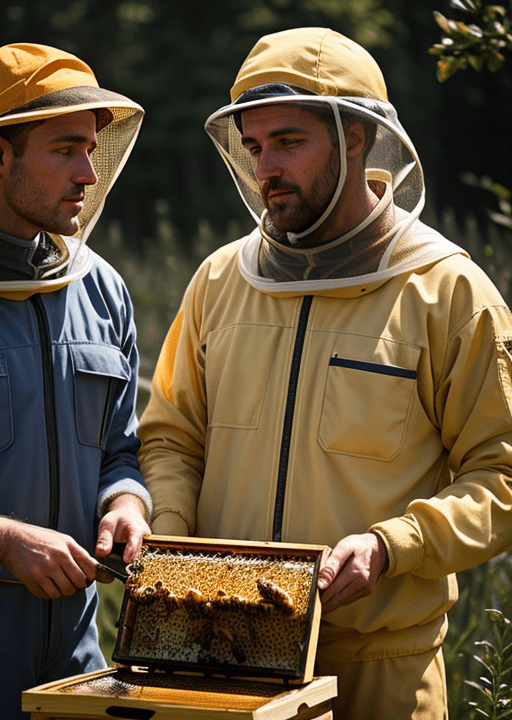
FAQ’s:
Why is it important to use quality beekeeping supplies?
- Using high-quality beekeeping supplies is crucial for ensuring the health and productivity of your beehives. They provide a safe environment for the bees, help prevent diseases and pests, and facilitate effective management of the colonies, enabling you to optimize honey production.
Where can I find reliable Beekeeping Supplies in Beekeeping Supplies Massachusetts?
- There are numerous places to find bee supplies in Beekeeping Supplies Massachusetts. You can check out local beekeeping supply stores, agricultural supply centers, or even online platforms dedicated to beekeeping equipment. It’s important to choose reliable sources that offer high-quality products to ensure the success of your beekeeping venture.
How can I choose the right type of beehive for my needs?
- The most common types of beehives are Langstroth, Top-Bar, and Warre hives. Each hive has distinct features and benefits. Consider factors such as personal preference, local regulations, long-term hive management, and ease of use before selecting a beehive that suits your needs.
How should I choose beekeeping protective clothing?
- When selecting beekeeping protective clothing, prioritize safety and comfort. Look for a full-body suit or jacket made of durable, lightweight fabric that provides ample protection against bee stings. Ensure that the clothing has a veil or hood that securely covers your face and neck, as those are particularly sensitive areas. Additionally, gloves, beekeeping boots, and a hat can further enhance your protection.
What safety precautions should I take while handling bees?
- When working with bees, it is essential to wear proper protective clothing, including a bee suit, veil, and gloves to minimize the risk of stings. Ensure that you work calmly and methodically, avoiding sudden movements or loud noises that could agitate the bees. Regularly inspect and maintain your equipment to prevent accidents and ensure your safety.
How does a honey refractometer safeguard honey quality?
- A honey refractometer accurately measures moisture content, ensuring optimal quality and longevity of harvested honey.
How can I protect my beehives from harsh Massachusetts winters?
- Protecting beehives during winters in Massachusetts is crucial for hive survival. Ensure that your hives have proper insulation by wrapping them in insulating materials or using hive wraps.
- Additionally, consider providing supplemental food sources, such as sugar syrup or fondant, to ensure the bees have enough food to sustain them throughout the winter months.
What are some common challenges for beekeepers in Massachusetts?
- Beekeepers in Massachusetts can face challenges such as pests (varroa mites, wax moths), diseases (American foulbrood, chalkbrood), extreme weather conditions, and pesticide exposure. It is important to stay informed, join local beekeeping associations, and adopt appropriate management practices to mitigate these challenges effectively.
What should I look for in a beekeeping supplier?
- When you are looking for the best beekeeping supplies in Beekeeping Supplies Massachusetts, it is important to keep a few things in mind. First of all, you want to make sure that the beekeeping supplies you purchase are of the highest quality. It is also important to make sure that you are buying supplies from a reputable beekeeping supplier.
